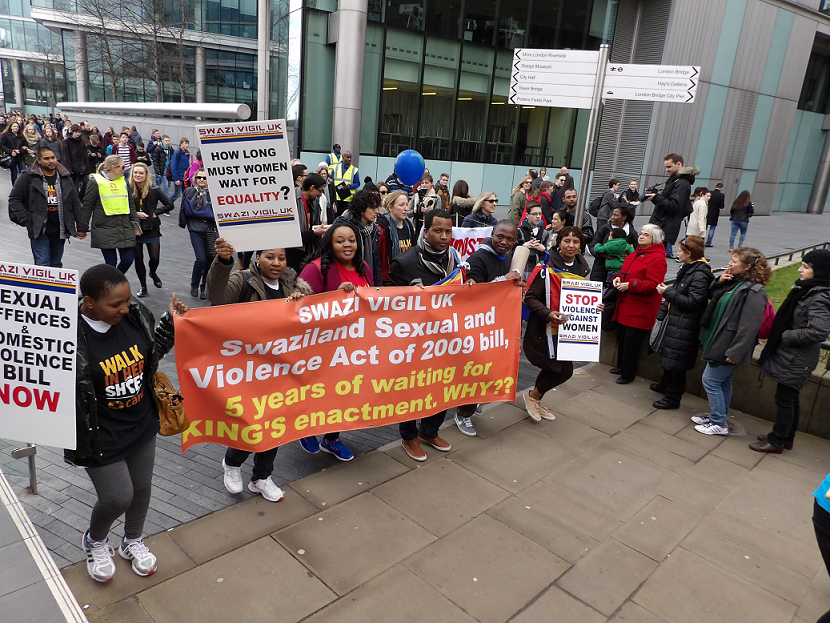The On the 27th of October 2011 Swaziland made history as the House of Assembly passed both bills on the same day. However there is still advocacy work to be done. Following the passing of the Bill by the House of Assembly it is to be debated and signed by the House of Senate before its presentation to His Majesty King Mswati III for Royal Assent.
Several weeks after the completion of the first phase, the Bill still remains in the House of Assembly due to administrative issues creating a barrier to its tabling in the House of Senate. In support of the enactment of the Sexual Offenses and Domestic Violence Bill, Swaziland Vigil UK participated in a walk which was organized by Care International UK (WALK IN HER SHOES), on the 8th of March 2015 at The Scoop at More London. Before we set off on our walk we had hosts of Radio 4's Woman's Hour Jane Garvey in conversation with -
- Gemma Arterton – an actress and Women's Equalities Campaigner [ best known for her role in James Bond Quantum of Solace and the hit West End Musical,
- Gemma Cairney - Radio 1 Dj
- Laura Bates - founder of the everyday sexism project
- Helen Pankuhurst - women's right activist in Ethiopia
- Jayanthi Kuru Utumpala - Sri Lanka equal rights campaigner
- Justice Greening - Secretary of State for International Development
Swazi Vigil UK activists:
- Khanyisile Ndlangamandla
- Clement M. Gama
- Theophilus (Theo) Ceko
- Christabel N. Magagula
- Delisile Kunene
- Rainy Dlamini
- Nokwazi Nxumalo
The above listed were representatives of Swaziland Vigil UK and women in Swaziland, who participated in the walk in support of the law which is still pending royal assent to enactment 5 years after it was passed in the house of assembly.
Our concern as Swazi Vigil UK activists and Swazis (eMaSwati) is: It has been 5 years now waiting for the royal assent for the bill to be made into law, why has this taken so long when the statistics of rape and child abuse, women's rights or lack thereof has escalated in Swaziland?
"Nine out of ten women in communities have been abused. They have been harassed, beaten, raped, mutilated or murdered, even in their own homes." a high level of violence towards women in the country.
The persistence of, and increase in sexual violence against women and girls is of great concern in Swaziland. Similarly, the lack of any protection remedies for women, whose lives are at risk from gender-based violence in the family, has been a long-standing concern of organizations in the country dedicated to improving the status of women and their quality of life. The extraordinarily high prevalence of HIV infection has also created a great sense of urgency, in light of the widely accepted view internationally that gender-based violence and women’s lack of legal equality and low socioeconomic status put them at increased risk of being infected and affected by HIV/AIDS.
As the UN Secretary-General’s Special Envoy for HIV/AIDS in Africa, Stephen Lewis, expressed it in his speech in March 2004: “I’ve been in the Envoy job for nearly three years. If there is one constant throughout that time, a large part of which has been spent traversing the African continent, it is the thus-far irreversible vulnerability of women…gender inequality is what sustains and nurtures the virus, ultimately causing women to be infected in even greater disproportionate numbers.”
There is urgent need for the Government of Swaziland to implement reforms arising from the provisions of the new Constitution and having the effect of promoting gender equality consistent with international human rights standards.
Sexual and Gender-Based Violence (SGBV) refers to “Any act of gender-based violence that results in, or is likely to result in, physical, sexual or psychological harm or suffering, including threats of such acts, coercion or arbitrary deprivation of liberty, whether occurring in public or private life. In 2010 alone, SWAGAA attended to a total of 1,578 cases of sexual and gender based violence. Between January and September 2011, 892 cases of human rights violations were reported to the organization. For over a decade, SWAGAA and other civil society organizations have been lobbying for the enactment of the Sexual Offenses and Domestic Violence Bill, and the Children’s Welfare and Protection Bill. Enacting this bill to become law will mean acts of violence against women, children and men will no longer be viewed as normal. It is the first step towards severe punishments for perpetrators of such violations.
The struggle continues…
By Nokwazi Nxumalo
References:
[1]. U.S. Department of State, Diplomacy in Action; 2010 Human Rights Report: Swaziland April 8, 2011. Bureau of Democracy, Human Rights, and Labor, 2010 Country Reports on Human Rights Practices. http://www.state.gov/j/drl/rls/hrrpt/2010/af/154372.htm. Accessed: 10 March 2015.
[2]. Journal of Pediatric Nursing, Knowledge and Perceptions of Parents Regarding Child Sexual Abuse in Botswana and Swaziland; http://www.pediatricnursing.org/article/S0882-5963(05)00303-9/abstract. Accessed: 10 March 2015.
